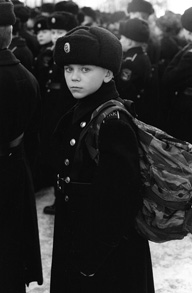The 3 Rooms of Melancholia
Melancholian 3 huonetta FINLAND, GERMANY, DENMARK, SWEDEN / 2004 / Russian, Chechen, Arabic, Finnish / Color, B&W / 35mm (1:1.85) / 106 min
FINLAND, GERMANY, DENMARK, SWEDEN / 2004 / Russian, Chechen, Arabic, Finnish / Color, B&W / 35mm (1:1.85) / 106 min
Director, Script, Photography: Pirjo Honkasalo
Editing: Niels Pagh Andersen, Pirjo Honkasalo
Sound: Martti Turunen, Mart Otsa, Kristiina Pervilä, Jaak Elling
Music: Sanna Salmenkallio
Producer: Kristiina Pervilä
Production Company: Millennium Film
Co-Production Companies: Lisbet Gabrielsson Film, Magic Hour Films, MA.JA.DE. Filmproduktion
World Sales: Deckert Distribution
The film follows the lives of children affected by the war in Chechnya in three different settings. Young children at a St. Petersburg military academy in northwestern Russia do nothing but train continuously, while in the devastated Groznyi, capital of the Chechen Republic, the lives of parents and children have been torn asunder. The last setting takes a look at life in a refugee camp in neighboring Ingush, where the children are frightened by the sounds of aerial bombs. In this touching look at the Chechen War, what surfaces are the expressions of children who live under tragic, futureless circumstances.
[Director’s Statement] The personal point of departure
Having completed my “Trilogy of the Sacred and Satanic,” feature documentary films Mysterion, Tanjuska and the 7 Devils and Atman, I felt I had purged myself of what I had sought from the documentary film: its purifying and implacable concreteness.
I felt an attraction and attachment to the logic of the dream, to which the fictional film provides the most natural path. The world of the dream is half in the past, half in the future.
I have always been stimulated not only by the Sacred and Satanic, but also by the Poetic and Political. It was this that drew me back to the documentary.
I don’t care for truths, for I see all thought as roiling foam that adheres to nothing nor holds fast; but in the time when I am not asleep or dreaming, I wish to know how the human tribe leads its life, shapes its history and expresses its will.
Europe is filled with people who need grace of some kind to cope with their righteous rage. The righteous rage turns a reflection against them. And life is no court of justice; justice does not prevail, life does. It rises out of chaos in an ascending spiral, briefly appears to have structure, and descends in the curve of a downward spiral toward fresh chaos.
Stripping away the icons of the enemy calls for the acceptance of grace along with righteousness. Grace is illogical and irrational—in other words, a profoundly gratuitous liberation from the compulsion to hate.
 Pirjo Honkasalo
Pirjo Honkasalo
Born 1947 in Helsinki, Finland. A filmmaker, cinematographer and professor of the arts, Pirjo Honkasalo has directed, written and worked as a cinematographer for documentaries and feature films for over twenty-five years. Her feature films, documentaries and short films have screened at international film festivals such as Cannes, Venice, Moscow and Berlin, and have received numerous awards. Works include Flame Top (1980), 250 Grams, A Radioactive Testament (1983), Da Capo (1985), Mysterion (1991), Tanjuska and the 7 Devils (1993), Atman (1996) which won the Joris Ivens Award at the International Documentary Film Festival Amsterdam and Fire-Eater (1998) which won the Grand Prix of AFI Los Angeles International Film Festival 1998 as well as two awards at the Locarno International Film Festival. |
